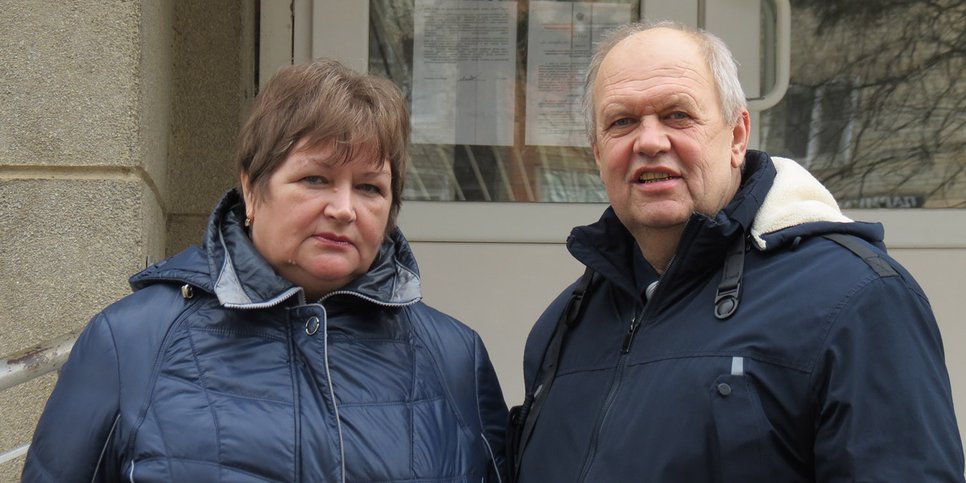In the photo: Alexander Ivshin with his wife
In the photo: Alexander Ivshin with his wife
In Krasnodar, Appeal Court Left Aleksandr Ivshin, 63, in a Colony for 7.5 Years. His Bible Was Ordered to be Destroyed
Krasnodar TerritoryOn April 15, 2021, the judge of the Krasnodar Regional Court, Victoriya Konofieva, upheld the record-breaking sentence to Aleksandr Ivshin, who was accused of extremism for discussing the Bible with friends. At the same time, the court ruled to destroy his Bible in a non-forbidden translation.
The verdict entered into force. The believer still insists on his innocence. He has the right to appeal against the verdict in cassation procedure, as well as in international instances.
Aleksandr Ivshin had been sentenced to 7.5 years of imprisonment in a general regime colony. This decision was made on February 10, 2021 by the judge of the Abinsk District Court of the Krasnodar Territory, Aleksandr Kholoshin, who found Ivshin guilty of organizing the activities of a banned organization (part 1 of Article 282.2 of the Criminal Code of the Russian Federation). The believer was taken into custody in the courtroom. The state prosecutor asked for a punishment for Aleksandr in the form of 8 years in a general regime colony.
Aleksandr Ivshin, a 63-year-old pensioner with 8 grandchildren, has been seriously ill with the coronavirus, having contracted it in one of the five pre-trial detention centers that he has changed since the sentencing. Prior to that, during the investigation, he had spent about 9 months under a recognizance agreement. In August 2020, the court seized his car, considering it necessary to ensure the execution of a possible sentence.
At the end of April 2020, FSB officers accompanied by Cossacks came to the house of Ivshin and 8 other families of Jehovah's Witnesses from the villages of Pavlovskaya and Kholmskaya with searches. This raid resulted in several criminal cases against peaceful believers. Two—Aleksandr Shcherbina and Oleg Danilov—have already been sentenced to real terms. Two more cases against Maksim Beltikov and Vladimir Skachidub are under consideration.
During the hearing of the case in court, the prosecution witness, from whom the FSB filed a statement, admitted that he did not know the defendant personally, but only saw him from afar. The fact that Aleksandr is the head of the LRO is just his assumption. Other evidence of Ivshin's “guilt” is audio recordings of prayers and a group photo with his fellow believers.
It is noteworthy that the court ruled to destroy Aleksandr’s Bible in the not prohibited Modern Translation. Yaroslav Sivulskiy, a representative of the European Association of Jehovah's Witnesses, said in this regard: “The President of Russia, by his decree, protected the Bible from judicial punishment, forbidding it to be recognized as extremist. But the court went further and ruled to destroy it altogether! Russian law enforcement officers repeat that they are combating not faith, but extremism, but this fact proves the opposite: we are witnessing anti-religious, anti-Christian persecutions."
The decision in the case of Aleksandr Ivshin was made against the background of events dedicated to the 70th anniversary of the deportation to Siberia of about 10,000 Jehovah's Witnesses. Russian human rights activists and religious scholars have repeatedly stressed that the persecution of this confession in the USSR had no legal grounds, just as it does not have them today.
Thus, Sergey Davidis, a member of the Council of the Memorial Human Rights Center and head of the Support for Political Prisoners Program, recalled that the only meaningful basis for the decision of the Supreme Court of April 20, 2017 to liquidate organizations of Jehovah's Witnesses was "a declaration of the religious superiority of Jehovah's Witnesses over other religious groups." ... "It is quite obvious that this is an absurd accusation," he stressed. "The conviction of the correctness of your religious doctrine in comparison with any other faith is natural for any religion."
